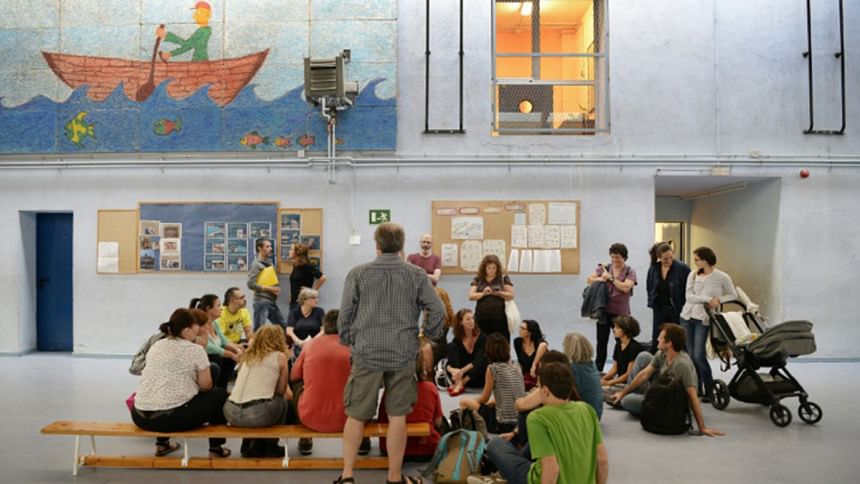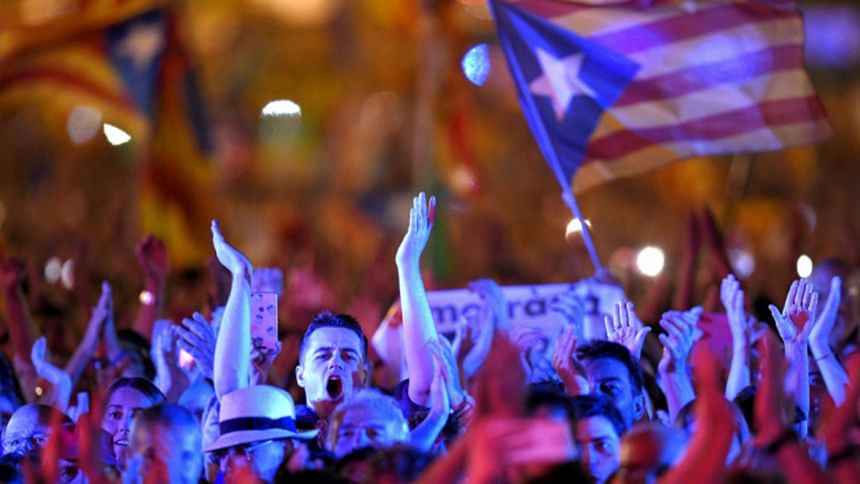Police seal off 1,300 polling stations in Catalonia

Police in Catalonia had already sealed over half of the 2,315 polling stations in the region mid-Saturday to stop an independence referendum from taking place, the Spanish government said, as separatists remained determined to fight for their right to vote.
Teachers, parents, students and activists in this wealthy northeastern region have leapt into action to defend the vote slated for Sunday, defying Madrid's warnings of repercussions by occupying more than 160 schools designated as polling stations, it said.
Enric Millo, the central government representative in Catalonia, told reporters 1,300 polling stations had already been sealed off.
He said that 163 of those had already been occupied when they were sealed off, which meant those inside were allowed to leave but no one could go in.
AFP reporters, however, visited several schools occupied by parents, students and locals where people could go in and out freely, indicating there may be more occupied buildings that have yet to be sealed off.
The standoff between the central government and Catalan leaders over an independence referendum opposed by Madrid has morphed into one of the biggest crises to hit Spain since democracy was restored after the death of dictator Francisco Franco in 1975.
As such, it has Spaniards the country over worried.
In Spain's major cities, Madrid, Barcelona, Sevilla, Santander, Alicante, Valencia and Malaga, thousands protested for Spanish unity.
"We shouldn't have got to this point. We've arrived at a point of no return," said Fernando Cepeda, a 58-year-old engineer, a Spanish flag tied around his waist in front of Madrid's city hall.
Call to remain peaceful
Catalan separatist leaders and organisers of "committees to protect the referendum" stressed that everyone must remain peaceful.
In one incident, though, someone fired a pellet gun on Friday night at a group of people standing in front of an occupied high school in the Catalan town of Manlleu, lightly injuring three people, police said.
The referendum has sown divisions among Catalans themselves, with the region deeply split on independence, even if a large majority want to be allowed to settle the matter in a legal vote.
Authorities in Madrid have instructed police to ensure no votes are cast in a referendum that the courts have ruled unconstitutional.
For days, they have been seizing electoral items such as ballot papers while prosecutors have ordered the closure of websites linked to the vote and the detention of key members of the team organising the referendum.
But those for the vote have mobilised.
On Friday, tractors paraded through Barcelona, some decked with the "Estelada", the separatists' flag of red-and-yellow stripes with a white star on a blue chevron.
They and firefighters have pledged to protect polling stations.
From district to district, people gathered to form "Committees to protect the referendum", using the Telegram messaging app to get organised and urging everyone to remain peaceful, said an AFP correspondent who saw some of the messages.
The move appeared to be partly coordinated by a platform of "schools open for the referendum."
Mobilisation will continue
Carles Riera, a lawmaker in the regional parliament for the radical CUP party, part of Catalonia's separatist coalition, vowed that mobilisation would continue after Sunday's vote -- if the "yes" camp won but Madrid opposed the result, as is almost certain.
"We're in a process of popular mobilisation that is going to last a while," he told reporters.
"This democratic wave, this level of auto-organisation will have to keep going for a long time to defend the republic."

On Friday, Spain's education ministry said in a statement that head teachers in Catalonia "were not exempt from liability" if they cooperated and allowed their schools to remain open for the vote.
Some schools have imagined innovative ways to circumvent an order that public spaces cannot be used for the referendum by organising leisure activities all over the weekend, from pyjama parties for the kids to volleyball games.
Barcelona's Joan Brossa high school, for instance, advertised a series of activities for Friday and Saturday, including film screenings, football matches and Zumba dance fitness classes.
It remained unclear though how people would be able to enter sealed-off schools on Sunday to vote, even if they are occupied.
The Mossos d'Esquadra Catalan police have warned about the risk of "disruption of public order" if efforts are made to prevent people from casting ballots.
Madrid has sent thousands of extra police officers from other forces to Catalonia -- which accounts for one fifth of Spain's economy -- to stop the referendum from happening.
Catalan Vice-President Oriol Junqueras has said that there are alternatives for citizens to vote, without saying what they are.

 For all latest news, follow The Daily Star's Google News channel.
For all latest news, follow The Daily Star's Google News channel. 








Comments